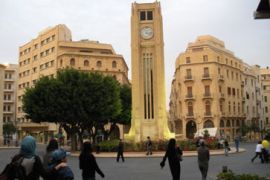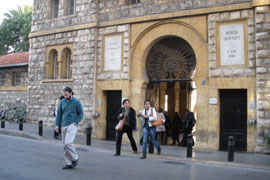Jobless from Dubai to Beirut
Many Lebanese expatriates who left the Gulf find a tougher job market back home.

 |
| The financial crisis has weakened banking and real estate in Dubai and other Gulf countries [EPA] |
Lured by the promise of a well-paid investment banking job in the growing markets of the Gulf, Ghassan Darwiche left Lebanon for Qatar in 2005.
He landed a banking job in Qatar and then started working at the Standard Chartered Bank in Manama, Bahrain in 2007.
Keep reading
list of 4 itemsA flash flood and a quiet sale highlight India’s Sikkim’s hydro problems
Why is Germany maintaining economic ties with China?
Behind India’s Manipur conflict: A tale of drugs, armed groups and politics
In 2008, he transferred to the wealth management department.
He believes the move was a logical one because of the Gulf’s prospering economy; global oil and gas prices were high and investment in the banking and real estate markets showed continued growth.
However, by January 2009, the department had became a “loss entity” for the bank.
“People were pulling out money because of the global financial crisis,” he said.
The bank then downgraded his department to commercial banking – credit card and insurance applications. Darwiche believed that he was being demoted and quit.
“We all want to climb the ladder. The Arab and European staff left, but the Indian banking professionals tended to stay and accept the downgrade. I didn’t want to go backward in my career,” he said.
However, three months after arriving in Beirut and finding no job opportunities for someone with his skills, Darwiche believes he would have fared better had he stayed.
“I’m one of the many victims of the financial crisis but the question now is what to do next.”
Reversal of fortunes
According to Lebanon’s finance ministry, there are some 350,000 Lebanese people working in the Gulf states, which in the past decade had become popular employment destinations.
However, with world markets in recession and foreign investments dwindling, fortunes have been reversed; the ministry says 15,000 Lebanese expatriate workers have returned in recent weeks.
They can be seen at bars and coffee shops in Beirut, lamenting about their newfound joblessness, finding solace among others in the same situation.
Hussein Zeaiter, a professor of economics at Lebanese American University, says the return of so many skilled yet unemployed workers will increase the burden on the already-struggling economy and will become a problem for the government to tackle.
“The Lebanese who work in the Gulf have high-ranking jobs. Relative to the workers from different nationalities, I think that the financial crisis will hit the Lebanese workers more due to the expertise of their majority in services and banking and finance.”
Rent, not buy
For Maroun Abu Nader, a 24-year-old graphic designer who worked at a publishing company in Dubai for eight months, being laid off “could have been a lot worse”.
He says that unlike many who worked and lived in the United Arab Emirates (UAE), he did not buy an apartment, despite the low interest rates on mortgages and loans, and did not get a car; he rented everything.
“Otherwise, I would be in debtors’ prison right now,” he says.
Abu Nader describes the scene in Dubai at the time of his departure a few weeks ago as: “Like a war without the violence”.
“People were fleeing the city en masse, terrified, leaving all of their belongings behind, unable to pay off many of the debts they incurred,” he said.
During his first few months in the UAE he nicknamed Dubai, the “golden apple” because it had big skyscrapers like New York – but with more gold.
He now says the city once known for its fast pace and opportunities is a “ghost town”.
Leaving Lebanon, again
 |
| Graduates from Lebanese universities will have a harder time finding jobs, economists say |
Abu Nader is luckier than most – his former manager in Dubai was able to find him a new graphic design job in Lebanon, through a service he provided to all 25 employees whose jobs were cut from the Dubai publishing company.
Darwiche, the investment banker, says he does not expect to stay in Lebanon, where the job market has been unable to provide sustainable opportunities for the country’s educated population.
As more Lebanese are expected to return from the Gulf and elsewhere in the coming months because of the global financial crisis, he says he will seek opportunities elsewhere.
He is considering Venezuela, where he grew up and also holds nationality; he believes there might be more job opportunities in South America than in the Gulf.
Darwiche says he also worries about the younger generation of skilled and educated Lebanese, entering a world of much more financial uncertainty and fewer job opportunities.
“Some people lost their money, and some businessmen are being affected,” says Darwiche. “But some people may have lost hope – especially young graduates.”
Zeaiter believes that returning Lebanese will find it daunting to get jobs in the local economy; he expects many to head to European and North American markets.
“I expect that the crowds in front of foreign non-Arab embassies will increase in the near future, mostly European countries and the US,” he said.
Zeaiter says Lebanon will continue to feel the fallout of the global economic downturn for the next five-to-six months.
“2009 will be more severe than previous years, not just for Lebanon but for the world. Global markets will need four-to-six years to recover. It will be a difficult task.”